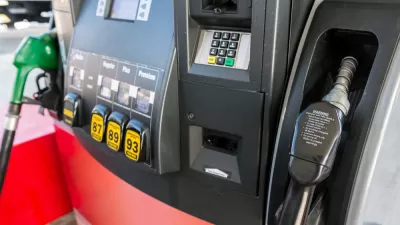The COP21 talks in Paris won't take on transportation directly, "the world’s fastest-growing energy-based contributor to greenhouse gases," writes David Jolly for The New York Times. Electric vehicles and fuel efficiency face formidable challenges.
Electric vehicle boosters have grand goals when it comes to the spread of electric or zero emission vehicles (ZEVs), such as the International ZEV Alliance Announcement on December 3 "to make all passenger vehicle sales in our jurisdictions ZEVs as fast as possible, and no later than 2050." While it will be interesting to see how successful they are in their 11 states, provinces, and countries, it will have little effect on a worldwide scale.
"The number of automobiles on the world’s roads is on pace to double [PDF]— to more than two billion — by the year 2030," writes David Jolly. "And more likely than not, most of those cars will be burning carbon-emitting gasoline or diesel."
But optimists argue that even in the case of cars with internal-combustion engines, carbon dioxide emissions can be cut significantly by measures like increasing fuel economy and introducing smart-driving technologies to make cars move about with greater efficiency.
However, there are daunting challenges to increasing fuel efficiency.
Reducing tailpipe carbon dioxide emissions “is absolutely possible,” said Daniel F. Becker, director of the Safe Climate Campaign, an environmental group based in Washington.
“But the automakers are attacking these standards as we speak, both in Congress and through a review of the program they demanded from the Obama administration,” Mr. Becker said. “Similar attacks are underway in the E.U.”
Neither Jolly nor Becker discuss another formidable challenge in reducing what Lewis M. Fulton, a researcher at the Institute of Transportation Studies at the University of California, Davis, calls “'carbon intensity' — the amount of carbon dioxide produced for each mile traveled," notes Jolly.
At the same time delegates were working in Paris on an international agreement to reduce carbon emissions, another international body met in a different European capital, Vienna, on December 4 and came to an agreement sure to increase carbon emissions from the transportation sector.
"The Organization of the Petroleum Exporting Countries (OPEC) said on Friday that it would keep producing oil at current levels, which are estimated to exceed 31 million barrels a day," write Stanley Reed and Sara Hamdan for The New York Times.
As a result, crude oil prices "plunged 5 percent on Monday to fall to their lowest levels since the 2009 global recession," writes Clifford Krauss of The Times. The "global oil glut that has caused prices to plunge by more than 50 percent since early last year" is sure to continue, note Reed and Hamdan.
As the research of Michael Sivak of the University of Michigan Transportation Research Institute has illustrated, cheap gas defeats fuel efficiency goals as motorists are attracted to more gas-gulping pickups and SUVs. At the same time, it is a major reason for the latest increases in vehicle miles traveled that have shattered the so-called 'peak driving' age that the U.S. had thought to be experiencing.
Hat tips to Jennifer Scholtes and Martine Powers of POLITICO Morning Transportation.
FULL STORY: Despite Push for Cleaner Cars, Sheer Numbers Could Work Against Climate Benefits

Planetizen Federal Action Tracker
A weekly monitor of how Trump’s orders and actions are impacting planners and planning in America.

Map: Where Senate Republicans Want to Sell Your Public Lands
For public land advocates, the Senate Republicans’ proposal to sell millions of acres of public land in the West is “the biggest fight of their careers.”

Restaurant Patios Were a Pandemic Win — Why Were They so Hard to Keep?
Social distancing requirements and changes in travel patterns prompted cities to pilot new uses for street and sidewalk space. Then it got complicated.

California Homeless Arrests, Citations Spike After Ruling
An investigation reveals that anti-homeless actions increased up to 500% after Grants Pass v. Johnson — even in cities claiming no policy change.

Albuquerque Route 66 Motels Become Affordable Housing
A $4 million city fund is incentivizing developers to breathe new life into derelict midcentury motels.

DC Area County Eliminates Bus Fares
Montgomery County joins a growing trend of making transit free.
Urban Design for Planners 1: Software Tools
This six-course series explores essential urban design concepts using open source software and equips planners with the tools they need to participate fully in the urban design process.
Planning for Universal Design
Learn the tools for implementing Universal Design in planning regulations.
Heyer Gruel & Associates PA
JM Goldson LLC
Custer County Colorado
City of Camden Redevelopment Agency
City of Astoria
Transportation Research & Education Center (TREC) at Portland State University
Camden Redevelopment Agency
City of Claremont
Municipality of Princeton (NJ)



























